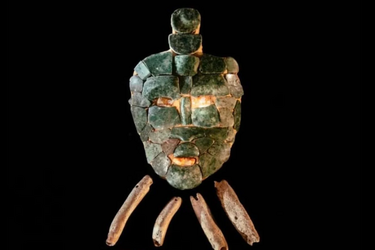Scientists find jade mask of storm god from 200 AD in Mexico

A team of archaeologists from Tulane University in the United States has made an important discovery during excavations at Chochkitama, a little-known Maya archaeological site in Petén, Guatemala. They discovered a jade mask believed to have belonged to a previously unknown Mayan king.
Dating back to the Classic Maya period (200-900 AD), Chochkitam is the subject of ongoing research. This place, which was first reported in 1909, is characterized by three significant monumental groups connected by a long central dam. Arkeonews writes about it.
Jade, which was highly prized by the Maya, had a symbolic meaning as a talisman of both the living and the dead. Jade masks found in tombs often symbolized deities or ancestors, reflecting the wealth and influence of the buried people.
A breakthrough came in 2021 when a LiDAR study revealed a tunnel dug by tomb robbers in the core of the royal pyramid. During a detailed study, archaeologists discovered that the intruders had missed a certain area in the pyramid's inner chamber.
In this missed area, the researchers discovered a burial site: a human skull, bones decorated with hieroglyphics, a coffin-shaped stone box, ceramic artifacts, and funerary offerings, including a pot, oyster shells, and a jade mask.
The name "Itzam Kokai Bahlam" is engraved in carvings and hieroglyphics on some of the bone fragments. Researchers believe that this name may belong to King May, who ruled Chochkitam around 350 AD. Carvings on one of the bones depicting the ruler holding the head of the Maya deity, mirroring the assembled jade mask, add to the intrigue.
All these artifacts and bones were brought to the Holmul Archaeological Project (HAP) laboratory for cleaning and analysis. Here, archaeologists carefully put the jade fragments together, reconstructing the entire jade mosaic mask.
Also read: A temple where Alexander the Great was worshipped discovered in Iraq
Leading archaeologist Francisco Estrada-Belly from Tulane University and his team used LIDAR mapping technology to determine the location of the burial site. The scientists believe that the mask they discovered is an embodiment of the storm god, who was revered by the Maya.
This discovery is significant because it provides a new perspective on Maya culture. It also suggests that Chochkitam was an important center of power and religion in the classical period.
As a reminder, a tomb with the family of Alexander the Great was found in Greece.
If you want to get the latest news about the war and events in Ukraine, subscribe to our Telegram channel!
